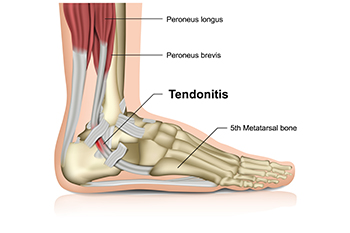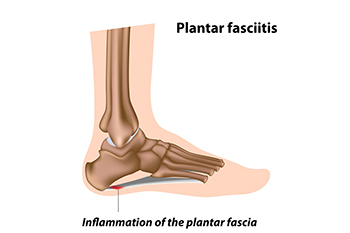Items filtered by date: May 2023
Various Reasons Why Stress Fractures Can Happen

Many people are aware when they have fractured a bone. The pain is sudden and often happens from an injury. This may not be true with stress fractures, as it develops over time. A stress fracture is considered to be a hairline fracture and is caused by repetitive movements. This is a common injury among people who enjoy running, or frequently participating in jumping activities. For example, osteoporosis can weaken the bones, which can make it easier for stress fractures to happen. Additionally, wearing shoes that do not fit correctly can gradually weaken the foot bones, possibly leading to developing a stress fracture. Mild relief may be found if sporting activities are temporarily stopped, and a supportive boot or cast is worn until complete healing has taken place. This can be followed by implementing specific stretches that can help to strengthen the foot. If you have a stress fracture, it is suggested that you confer with a podiatrist who can effectively diagnose and treat this foot condition.
Activities where too much pressure is put on the feet can cause stress fractures. To learn more, contact one of our podiatrists from ABC Podiatry. Our doctors can provide the care you need to keep your pain free and on your feet.
Dealing with Stress Fractures of the Foot and Ankle
Stress fractures occur in the foot and ankle when muscles in these areas weaken from too much or too little use. The feet and ankles then lose support when walking or running from the impact of the ground. Since there is no protection, the bones receive the full impact of each step. Stress on the feet can cause cracks to form in the bones, thus creating stress fractures.
What Are Stress Fractures?
Stress fractures occur frequently in individuals whose daily activities cause great impact on the feet and ankles. Stress factors are most common among:
- Runners
- People affected with Osteoporosis
- Tennis or basketball players
- Gymnasts
- High impact workouts
Symptoms
Pain from the fractures occur in the area of the fractures and can be constant or intermittent. It will often cause sharp or dull pain with swelling and tenderness. Engaging in any kind of activity which involves high impact will aggravate pain.
If you have any questions please feel free to contact our office located in Columbus, OH . We offer the newest diagnostic and treatment technologies for all your foot and ankle needs.
How Did I Hurt My Achilles Tendon?

There is no mistaking the discomfort that can happen from enduring an Achilles tendon injury. It is often a sudden, sharp pain that occurs when this tendon becomes torn. It can happen to runners who increase speed and mileage too quickly, often without properly warming up. The Achilles tendon is located in the lower portion of the calf and connects the heel to the calf muscles. This type of injury may also happen while running on hard or uneven surfaces, or if the foot suddenly turns out. In addition to the intense pain this injury can cause, the affected foot may feel stiff in the morning, and is often painful when touched. Treatment often begins by stopping the activity that caused the injury, and a brace or cast may need to temporarily be worn that can provide stability as it heals. If you have had an Achilles tendon injury, it is strongly suggested that you consult with a podiatrist who can guide you toward treatment options that are correct for you.
Achilles tendon injuries need immediate attention to avoid future complications. If you have any concerns, contact one of our podiatrists of ABC Podiatry. Our doctors can provide the care you need to keep you pain-free and on your feet.
What Is the Achilles Tendon?
The Achilles tendon is a tendon that connects the lower leg muscles and calf to the heel of the foot. It is the strongest tendon in the human body and is essential for making movement possible. Because this tendon is such an integral part of the body, any injuries to it can create immense difficulties and should immediately be presented to a doctor.
What Are the Symptoms of an Achilles Tendon Injury?
There are various types of injuries that can affect the Achilles tendon. The two most common injuries are Achilles tendinitis and ruptures of the tendon.
Achilles Tendinitis Symptoms
- Inflammation
- Dull to severe pain
- Increased blood flow to the tendon
- Thickening of the tendon
Rupture Symptoms
- Extreme pain and swelling in the foot
- Total immobility
Treatment and Prevention
Achilles tendon injuries are diagnosed by a thorough physical evaluation, which can include an MRI. Treatment involves rest, physical therapy, and in some cases, surgery. However, various preventative measures can be taken to avoid these injuries, such as:
- Thorough stretching of the tendon before and after exercise
- Strengthening exercises like calf raises, squats, leg curls, leg extensions, leg raises, lunges, and leg presses
If you have any questions please feel free to contact our office located in Columbus, OH . We offer the newest diagnostic tools and technology to treat your foot and ankle needs.
Heel Pain and Plantar Fasciitis

Plantar fasciitis is a common foot condition that can cause debilitating pain. It may compromise the ability to complete daily activities and medical treatment is eventually sought. It is a condition that affects the plantar fascia, which is defined as a band of tissue on the sole of the foot that connects the heels to the toes. An injury can cause the plantar fascia to become irritated or torn, which may happen from running on hard or uneven surfaces. It may also occur from gradual or sudden weight gain, in addition to wearing shoes that do not fit correctly. Some people have a tight Achilles tendon, which connects the calf muscles to the heel. This may result in severe heel pain, which can be a symptom of plantar fasciitis. Patients who have developed this condition may notice the pain is worse in the morning upon arising and the affected foot may be swollen and red. If you are afflicted with plantar fasciitis, it is strongly suggested that you schedule an appointment with a podiatrist as quickly as possible who can offer you effective treatment options.
Plantar fasciitis can be very painful and inconvenient. If you are experiencing heel pain or symptoms of plantar fasciitis, contact one of our podiatrists from ABC Podiatry. Our doctors can provide the care you need to keep you pain-free and on your feet.
What Is Plantar Fasciitis?
Plantar fasciitis is the inflammation of the thick band of tissue that runs along the bottom of your foot, known as the plantar fascia, and causes mild to severe heel pain.
What Causes Plantar Fasciitis?
- Excessive running
- Non-supportive shoes
- Overpronation
- Repeated stretching and tearing of the plantar fascia
How Can It Be Treated?
- Conservative measures – anti-inflammatories, ice packs, stretching exercises, physical therapy, orthotic devices
- Shockwave therapy – sound waves are sent to the affected area to facilitate healing and are usually used for chronic cases of plantar fasciitis
- Surgery – usually only used as a last resort when all else fails. The plantar fascia can be surgically detached from the heel
While very treatable, plantar fasciitis is definitely not something that should be ignored. Especially in severe cases, speaking to your doctor right away is highly recommended to avoid complications and severe heel pain. Your podiatrist can work with you to provide the appropriate treatment options tailored to your condition.
If you have any questions please feel free to contact our office located in Columbus, OH . We offer the newest diagnostic and treatment technologies for all your foot and ankle needs.
Reminder: When Was the Last Time...?
Pinky Toe Pain

As small as the pinky toe is, it can become extremely painful when it is injured. Pain in this toe may come from a variety of causes including a break or sprain, wearing shoes that are too tight, or a corn. This toe is more prone to injury because it is on the outside of the foot. An injury to this toe may result in swelling and pain. A broken or fractured pinky toe can happen if it is stubbed from a direct blow or a heavy object falls on it. A sprained pinky toe can happen from bumping the toe or stretching it beyond its normal range. It involves injury to the ligament of the toe. A corn, with hardened layers of skin, can develop on the small toe in response to pressure or friction and often from wearing tight-fitting shoes. Since the varied causes of pain in the pinky toe result in similar symptoms, if you have pain in this toe that does not resolve with rest, it is suggested that you visit a podiatrist for a proper diagnosis and treatment. This is important to ensure that it heals properly and does not lead to other problems.
Toe pain can disrupt your daily activities. If you have any concerns, contact one of our podiatrists of ABC Podiatry. Our doctors can provide the care you need to keep you pain-free and on your feet.
What Causes Toe Pain?
Most severe toe pain is caused due to a sports injury, trauma from dropping something heavy on the toe, or bumping into something rigid. Other problems can develop over time for various reasons.
Toe pain can be caused by one or more ailments. The most common include:
- Trauma
- Sports injury
- Wearing shoes that are too tight
- Arthritis
- Gout
- Corns and calluses
- Hammertoe
- Bunions
- Blisters
- Ingrown toenails
- Sprains
- Fractures (broken bones)
- Dislocations
When to See a Podiatrist
- Severe pain
- Persistent pain that lasts more than a week
- Signs of infection
- Continued swelling
- Pain that prevents walking
Diagnosis
In many cases the cause of toe pain is obvious, but in others, a podiatrist may want to use more advanced methods to determine the problem. These can range from simple visual inspections and sensation tests to X-rays and MRI scans. Prior medical history, family medical history, and any recent physical traumatic events will all be taken into consideration for a proper diagnosis.
Treatment
Treatments for toe pain and injuries vary and may include shoe inserts, padding, taping, medicines, injections, and in some cases, surgery. If you believe that you have broken a toe, please see a podiatrist as soon as possible.
If you have any questions please feel free to contact our office located in Columbus, OH . We offer the newest diagnostic tools and technology to treat your foot and ankle needs.
Types of Ankle Surgery

Ankle surgery may be performed if the ankle has been severely injured, or if there is existing arthritis or torn ligaments. Ankle fusion is a type of surgery that has increased dramatically in recent years. This may follow any conservative treatments that may have failed, leaving surgery as the only option. A displaced ankle fracture may require a closed reduction procedure to be performed. This is done by aligning the bones from the outside of the ankle, which may produce severe pain during the procedure. If the bones cannot be manipulated from the outside, an open reduction can be done that uses screws or plates. This may be a common type of surgery among patients who have ankle instability. If you have ankle pain, it is suggested that you confer with a podiatrist who can determine if having ankle surgery is right for you.
Foot surgery is sometimes necessary to treat a foot ailment. To learn more, contact one of our podiatrists of ABC Podiatry. Our doctors will assist you with all of your foot and ankle needs.
When Is Surgery Necessary?
Foot and ankle surgery is generally reserved for cases in which less invasive, conservative procedures have failed to alleviate the problem. Some of the cases in which surgery may be necessary include:
- Removing foot deformities like bunions and bone spurs
- Severe arthritis that has caused bone issues
- Cosmetic reconstruction
What Types of Surgery Are There?
The type of surgery you receive will depend on the nature of the problem you have. Some of the possible surgeries include:
- Bunionectomy for painful bunions
- Surgical fusion for realignment of bones
- Neuropathy decompression surgery to treat nerve damage
Benefits of Surgery
Although surgery is usually a last resort, it can provide more complete pain relief compared to non-surgical methods and may allow you to finally resume full activity.
Surgical techniques have also become increasingly sophisticated. Techniques like endoscopic surgery allow for smaller incisions and faster recovery times.
If you have any questions please feel free to contact our office located in Columbus, OH . We offer the newest diagnostic and treatment technologies for all your foot and ankle needs.





